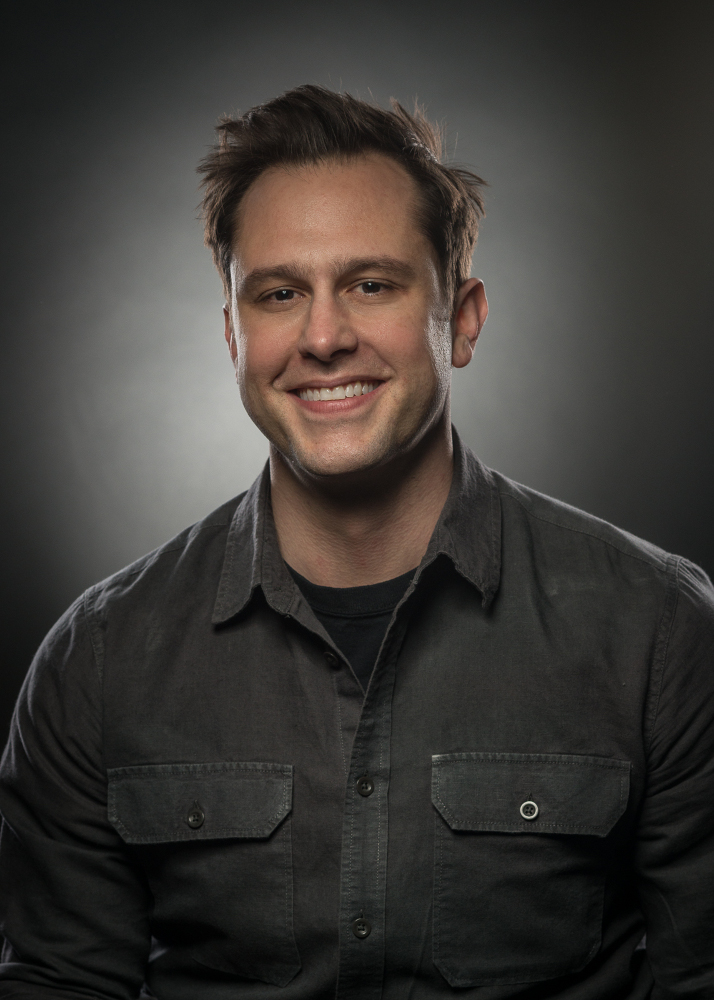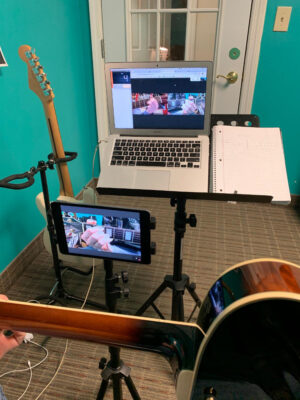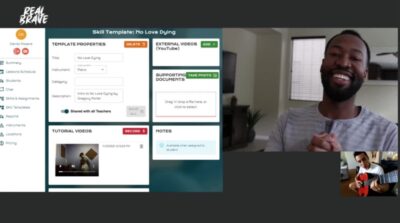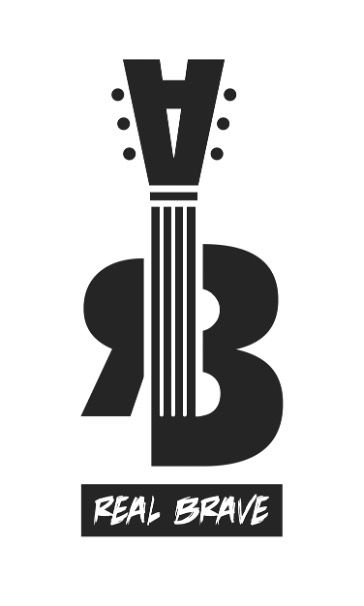Audio Business Pivot: How A Studio Amped Up Online Music Lessons
Music- and audio-based businesses must often quickly make big changes. A series of net-gain actions has to happen, guided by the best available information.
That mission hit Real Brave Audio in the face when the pandemic began. Like any music business professional, Real Brave founder Dan Powers, Jr. had enough to think about in early 2020 – then Covid hit, forcing a complete business model rethink with little room for error. His brick-and-mortar based business – three recording studio/rehearsal spaces in Manhattan, Queens, and Oakland – needed to transform rapidly.

Real Brave founder Daniel Powers Jr is navigating music business shifts.
(Photo credit: Corporate Executive Portraits Commercial) Photography NYC NJ
They made it work. In just under two years, Brave expanded into something else entirely. Now it’s the parent of PracticePad, an online music lessons portal incorporating video, custom tutorials, and gamification to teach people new instruments. Its built-in web apps track each student’s progress, bolstered by video and recording tools and hundreds of tutorials.
Transforming Real Brave wasn’t easy. Powers had to turbocharge PracticePad’s development to keep his company going, but in 2022 the platform has momentum. They’ve gone a step beyond by launching After School Rocks, a nonprofit music program for children in housing shelters who have been chronically homeless.
On top of that, they have a podcast, Real Brave Live, with its own view on music. Want to know which tracks made “The Top 10 Worst Songs of All Time”? Listen and be enlightened!
Next time you’ve got to act fast recall this convo: quick decisions relied on logic, feel, and drive. There are actionable insights in the Real Brave story.
You founded Real Brave Audio in 2003. What inspired the company’s name?
Naming my company was a lot like naming a band. I didn’t want anything silly, but a name that reflected where I was on my personal journey. I was leaving the life of a performer to start my own business, which meant stepping out of my comfort zone and being brave.
So, I knew that would be the core concept. The tricky part was matching that concept with an available domain name for our website!
What were Real Brave Audio’s initial offerings?
Real Brave Audio started out as a recording studio where I could continue creating my own music. However, I also wanted to teach others and provide them with a place to express themselves, so I offered lessons on the side. I began composing using a Digi 002 console mixer, which led to a few gigs.
From there, I focused on recording bands — especially hip hop groups. That was our initial offering when we opened our first location in 2006.
How did Real Brave evolve and grow over the years up until the pandemic? What were some of the major drivers of those changes?
Real Brave Audio has evolved in a number of ways over the years, with the biggest change being the services we offer.
We stopped recording and fixed our sights on teaching and providing students with a complete music learning experience. We also dropped the “Audio” from our name when our adolescent program began to really take off. And the company itself has experienced tremendous growth. Real Brave started in a humble Queens apartment in 2003 and has since expanded to three brick-and-mortar studios.
From 2008 to 2020, I focused on building systems and learning how to create a company that would flourish. When I began hiring, it was so fulfilling to have people rally around an idea, and to give them the opportunity to do something they always wanted to do: Teach. We became more than a company; we became a culture.
When did you realize that the pandemic was going to present a major challenge to Real Brave? How did you evaluate your choices at that point?
When Milan shut down in [early March] 2020, I realized that COVID-19 was going to be a huge problem for us. Lockdowns were inevitable in the U.S., and we had three in-person locations that would be rendered useless for an indefinite period of time. The world was going online, and we were no longer special.
Luckily, we already had a basic version of PracticePad at that point, and even had some buy-in from some of our customers. But it needed a video room and other features to really make it a complete online platform, so we got to work building it out.
From On-Site to Online: Perfecting the Pivot
How did PracticePad start to grow from there?
PracticePad was born of the idea that allowing students to track their progress helps them get better and inspires them to stick with their lessons. We launched the basic version in 2016 to provide those tracking capabilities and encourage students to make music a daily, habitual practice.

PracticePad’s online learning tools are designed to ease video interaction between students and teachers.
Since the emergence of COVID-19, we’ve bolstered the platform with a number of powerful features, including virtual lessons tailored to individual needs and skill levels; an audio and video suite encompassing a wide range of instruments; a tutorial library; access to lesson notes and personalized demonstrations; and much more.
What was it like pivoting from a brick-and-mortar business to an online education platform?
The pivot was hard; it’s taken almost two years to bring our idea to fruition. But the results are worth it. It’s a wonderful platform that provides endless opportunities for Real Brave and our students.
For one, our pool of potential students is no longer bound by geography. While we’re not going to start teaching around the world overnight, we do have the ability with a proven system that our instructors are well-versed in.
And for our students, we’re offering far more than a standard course. Not only can they track their progress day to day, but their lessons are tailored to their specific needs.
What challenges and surprises came up before you could launch PracticePad?
The development process is very challenging. Having an idea is one thing; bringing it to life is something entirely different.
To build a solid backend, you have to spend money on good developers that understand your vision. Then you have to prove it works through extensive testing in the marketplace.
There are a million apps and platforms out there, and they don’t all fill a need. I believe PracticePad fills a need, and right now we’re focused on the launch and getting the platform into peoples’ hands.
What have you found that people are looking for now in an online music education program?
We asked a couple hundred people at random what they wanted in an online program, and there were two main responses.
The first was the flexibility to learn at their chosen pace. The second was an immersive experience. PracticePad meets both these criteria. In particular, the ability to track their progress allows students to understand exactly what they need to work on and where they’re tripping up.
There are so many online music education programs to choose from. What do you feel distinguishes the PracticePad offering? What’s a typical lesson like?
Progress tracking is a big differentiator, of course, as is the live one-on-one video room. It’s very convenient to have the video room inside the platform instead of having to leave it to use Zoom.
Another differentiator is the videos our teachers make, which are essentially custom tutorials that guide students on what they should be working on for the week. When we ask our students what they like best about PracticePad, they always mention the videos in the lesson room, and how they help remind them what to focus on to improve.
I’ve had many tell me that our videos are better than those on YouTube because they are personalized to them. They just simply log into their account, and it’s all right there and completely geared towards them.
How do you find instructors – is that a challenge?
Before the pandemic, I could lean out my front door, throw a rock, and hit a guitarist. But not anymore! These days we lean on Indeed pretty heavily. We’ve also used Facebook at times.
We can teach just about anything, but we tend to concentrate more on the rock instruments — bass, drums, guitar, vocals, etc. There’s not much of a need for the tuba these days.
Is it true that a teacher that taught you is now a teacher at your school?
It is! I started guitar lessons with him at 12 and he just kind of understood me. I got good and after I stopped taking lessons, I spent several years trying to make it as a musician. I was in a band, did a little touring, busked in subways, and just did whatever I could to make it happen.
But it wasn’t working, and the idea of being a rock star was replaced with one of starting a business and creating a place like the one I had to go to when I was learning.
In 2012 that same instructor came to my studio and read the biography about Real Brave that was on the wall. When he saw me, he just said, “I want to be a part of this.” He was totally over-qualified, but I hired him, and he’s been an integral part of our operations ever since.
Audio for Online Learning
On the audio side, what specific audio challenges must be solved for the program to work well, both for the instructor and student?
There are two main obstacles when it comes to audio for PracticePad, or any other platform for that matter.
Due to the number of devices we all have connected to the WiFi in our homes, bandwidth can become limited, which affects audio quality.
In addition, not all devices are created equally. Apple tends to have good audio quality across its entire product lineup. To take advantage of this, we have an iOS app coming out that will help ensure a better experience for iPhone and iPad users. However, with Android, multiple manufacturers are creating the hardware, so there isn’t the same consistency across devices.
So, if an instructor is on an iPad and the student is on an Android tablet, there might be some audio issues. It’s just going to take time for technology to catch up to the needs of platforms like PracticePad.
Starting a Music-Based Nonprofit
You also founded After School Rocks, a nonprofit organizing music programs for children and schools in need. Why was this important for you?
I started a nonprofit because I’ve been very fortunate with the success of Real Brave and wanted to give something back. I felt like there was an opportunity to do that in schools, so I started After School Rocks, a 501(c)(3) charity that organizes music programs for formerly homeless children and schools without access to music education.
I started this particular program because of an experience I had in 2012 buying a house on short sale. To make a long story short, my family and I lived in this house for five months with a pretty good chance of getting kicked out for reasons beyond our control. It was really scary. I had three kids and they were in danger of becoming homeless.
After our crisis passed, I looked into it and discovered that over 100,000 students in New York City are homeless. One of my board members got me in touch with a supportive housing program, and I just fell in love with it. It’s one of the most amazing feelings to be able to help these families through the crisis of homelessness.
The kids in our program have lived through experiences that are hard to even imagine, and none of it happened because of choices they made. It’s been an honor to be able to give them an outlet to express themselves and heal through music.
After going through the process of founding a 501c3 charity, what advice would you have for a musician or audio pro who is also considering starting a nonprofit?
A great place to start is with the Volunteer Lawyers for the Arts, which offers a variety of services to non-profits of all sizes. Among other things, they can offer legal services during the start-up phase and when applying for tax-exempt status with the IRS.
Trends in Online Music Education
What’s next for PracticePad? How do you think the online music education sector will shift next?
As far as PracticePad goes, the next thing on the horizon is our app, which will be coming out shortly on the App Store. I can also see integrating Alexa at some point in the future.
For the online music education sector as a whole, the future greatly depends on the success of the players that are in it right now. We want to take this opportunity and break away from the Guitar Centers of the world and carve out our own niche. Having a staff of over 40 instructors that are ready to go gives us a big competitive advantage.
What’s your Big Takeaway about the art of the pivot?
Trust your gut, know your numbers, and understand that there are no overnight success stories.
When I told my managers that we were closing due to the pandemic and gave them my plan for moving forward, my decisions came out of years of experience. I knew we had to change in order to deliver something new and to keep our clients safe, and I knew that it was going to take time.
For me, it was really like starting a new company. It took me 10 years to build my business to what it was, and I wasn’t sure how long it would take to build it into something else. That’s up to the market to decide, but I keep working at it every day.
Last question: What advice do you have for audio and music pros who are considering their own big pivot?
It really depends on what they’re doing. If they’re thinking about making a pivot, it not only has to solve a need for their customers, but it has to serve their needs as owners as well: If they’re going to be doing the work, they need to be sure it works for them.
I’m really happy with the direction Real Brave took. It’s creative and innovative, and that works for me. Know your values and the kind of culture you want to be a part of, and go from there.
- David Weiss is an Editor for SonicScoop.com, and has been covering pro audio developments for over 20 years. He is also the co-author of the music industry’s leading textbook on synch licensing, “Music Supervision, 2nd Edition: The Complete Guide to Selecting Music for Movies, TV, Games & New Media.” Email: david@sonicscoop.com
Please note: When you buy products through links on this page, we may earn an affiliate commission.









[…] That mission hit Real Brave Audio in the face when the pandemic began. Like any music business professional, Real Brave founder Dan Powers, Jr. had enough to think Read more… […]